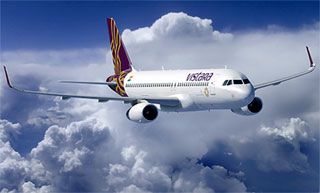The preferred entry strategy for all newcomers has been discounted fares, which, in effect, leaves almost all airlines bleeding on their earnings.
 Three weeks after Vistara, promoted by Tata Sons and Singapore Airlines, started operations, detractors have started to say that it won't be a cakewalk for the country's latest airline: its average passenger load factor (PLF) of 56 per cent is way below 75-80 per cent reported by rivals.
Three weeks after Vistara, promoted by Tata Sons and Singapore Airlines, started operations, detractors have started to say that it won't be a cakewalk for the country's latest airline: its average passenger load factor (PLF) of 56 per cent is way below 75-80 per cent reported by rivals.
Some say it made a mistake by not responding to the fare war kicked off by Air India and lost an opportunity to let flyers sample its services.
Even market leader IndiGo and loss-making Jet Airways cut fares to take on Air India. Still others say its premium economy class, priced 20 per cent higher than economy seats, hasn't taken off and its occupancy is just 35 per cent.
But ask Vistara's chief commercial officer, Giam Ming Toh, and he will tell you that most of these are startup pangs, as the airline had little time between getting its air operator's permit and launching operations.
The permit came on December 15, bookings opened on December 19 and the first flight took off on January 9. Also, it launched during the worst time of the year when the northern part of the country was under thick fog and everybody had booked for holidays much earlier. "Yes, our timing was not the best but we decided to start operations rather than wait. Looking at that, 56 per cent PLF is pretty good," Toh says.
In addition, the time slots (and hence the flight numbers) allotted to Vistara on the Mumbai-Delhi circuit, the country's busiest route, were valid only till February 15 when the fog season ends. It meant the airline could not advertise its schedule or book tickets beyond February 15.
Rightly so, because two of its three daily Mumbai-Delhi flights will be allotted new time slots and the third may also see its number change. It is a similar challenge which has impelled Vistara not to offer 60- and 90-day advance tickets with lower fare tags as it has to again contend with changes in the summer schedule from April 1.
"While the Delhi airport has a lot of capacity, the issue is to get slots in the morning and evening when business travellers fly, and that is a challenge. Airlines which already have a lot of flights get the best slots," says Toh.
The lean season
There was another challenge. For most corporations, December and January are lean travel months. Travel agents are busy this time of the year trying to meet their volume targets for airlines with which they are tied up for the year, which means they wouldn't have the time and energy to push a new airline.
So did Vistara adjust its fares for the lean days? Its initial fare was over Rs 7,000 but went down after some weeks to around Rs 5,500.
Toh says that as the airline had only 20 days to launch after the bookings were announced, it decided not to offer the 30-day advance purchase fare (the industry norm), though it would have meant cheaper fares in the initial days of launch.
That is why tickets bought at a later date (when the gap between booking and flying is 30 days or more) show a lower fare, and not because the airline dropped prices.
So far as matching the lower fares of rivals is concerned, Toh insists Vistara will never get "into a ruinous fare war" but says it "will never say a complete no to fare discounting". He says: "Whatever we do, we will not give away tickets. We are looking for a sustainable disciplined business model."
Rivals won't mind that. In spite of cheaper jet fuel, the industry is mired in losses. The preferred entry strategy for all newcomers has been discounted fares, which, in effect, leaves almost all airlines bleeding on their earnings.
In contrast, Vistara is banking on its service to become the differentiator. That is why it has introduced the premium economy class - for the first time in the domestic market. Senior executives in competing airlines say its prices are too steep, and that's why it is not getting much traction. Based on Vistara's declared fares to the government, the minimum slab of a premium economy seat is double that of an economy seat (Rs 4,000).
In comparison, on IndiGo and SpiceJet, passengers need to pay only Rs 500 extra for more space and priority check-in.
Toh is hopeful that Vistara's premium economy class will succeed because though the premium of 15-20 per cent is somewhat higher than IndiGo's 12 per cent, it comes with more leg space and an array of other services. "During the slowdown, a lot of senior managers shifted from business to economy. Many companies are now looking at upgrading them and premium economy offers an answer," Toh says.
The low PLF doesn't bother Toh too much either. He knows that most companies have yearly contracts and will look at giving business to Vistara only from April. Most companies, he knows, will wait till Vistara presses more aircraft into service and adds premium economy seats before they alter their travel policy.
This will be possible once Vistara introduces five flights on the Delhi-Mumbai route from February 16, an additional flight to Ahmedabad, a new flight to Hyderabad from March, and once it gets all its five planes by the end of March.
Vistara is preparing for the summer rush and is concentrating on services that would differentiate it from the competition. For instance, its planes are currently on air for less than 10 hours a day (compared to rivals' 12-14 hours) and can be stretched to fly to some more destinations.
But the airline decided that in the fog season it must have some cushion so that punctuality is ensured. It has also tried to make fares simple for passengers: compared to Jet Airways which has 12 to 14 fare slabs, Vistara has only half the number. It has also merged the jet fuel surcharge into the basic fare.
The airline refuses to say if it's breaking even at the current PLF and meeting its costs. But Toh is in no hurry. He says if a flight has a PLF of around 75 per cent, then it is time to add a flight on the same route.
Vistara is already in talks to offer holiday packages (after all, its parent, the Tata group, owns the Taj chain of hotels) to flyers. On the cards are offers of cars on rent, and tie ups with credit cards and insurance companies. Of course, none of these is a unique innovation.
The question is whether Vistara can stick to its disciplined fare structure, despite competitors playing the fare game, and woo customers with its better service.
THE STORY SO FAR
DECEMBER 15: Permit received
DECEMBER 19: Booking opens
JANUARY 9: First flight takes off between Delhi and Mumbai
FEBRUARY 16: Flights between Delhi-Mumbai to be scaled up to 5 daily from 3 now
Two new destinations—Goa and Hyderabad—will be added
One more flight will be added to the Delhi-Ahmedabad route










